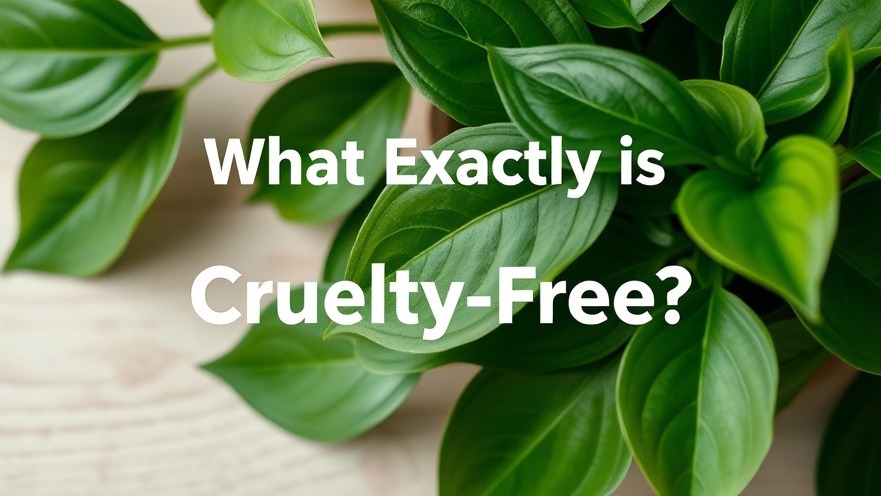
Understanding the Cruelty-Free Label: A Necessity for Responsible Consumers
The cruelty-free label has become increasingly common on a variety of consumer products, leading many shoppers to wonder: what does it really signify? While most people associate cruelty-free products with cosmetics and skincare items, this label can also apply to clothing, accessories, and cleaning supplies. At its core, it means that no animals were harmed in the testing or production of the item in question. With serious ethical implications underlying animal testing practices, understanding this label is crucial for anyone looking to make responsible consumer choices.
The Dark Reality of Animal Testing
Animal testing raises significant ethical and environmental concerns. Each year, an estimated 126.9 million non-human vertebrates are bred and subsequently used in experiments, often without adequate legal protections against inhumane treatment. Animals, including many primates, are frequently taken from their natural environments and subjected to painful testing regimes. Not only does this practice inflict suffering on individual animals, but it also leads to considerable biodiversity loss and contributes to pollution through the disposal of biological waste from labs.
Cruelty-Free vs. Vegan: What’s the Difference?
While both 'cruelty-free' and 'vegan' labels are essential for ethical consumer choices, they are not synonymous. A product labeled as cruelty-free has not been tested on animals but may still contain animal-derived ingredients, making it non-vegan. Conversely, a vegan product, devoid of animal ingredients, might still involve animal testing during its development. For consumers dedicated to ethical shopping, it’s important to seek products marketed as both cruelty-free and vegan to ensure no harm was done to animals in either production or ingredient sourcing.
The Importance of Certifications
In a marketplace rife with misleading claims, understanding legal definitions and certifications is paramount. Currently, there isn't a universal legal definition for 'cruelty-free,' allowing brands to label their products as such without consequence. Certifications like the Leaping Bunny Certification provide a reliable standard. To achieve this distinction, brands must adhere to a stringent set of criteria. They establish a cut-off date beyond which no animal tests may be conducted and undergo independent audits to ensure compliance. For conscious consumers, checking for these certifications is a valuable step toward avoiding brands that misrepresent their practices.
A Sustainable Approach: Why Cruelty-Free Should Matter to Travelers and Hospitality Professionals
Travelers, especially eco-conscious ones, should certainly consider cruelty-free products as part of their sustainability strategy. For example, hotels and resorts can enhance their eco-friendly credentials by offering cruelty-free toiletries and cleaning supplies. This not only satisfies environmentally aware guests but also contributes to a larger movement toward sustainable development within the hospitality industry. By reducing reliance on products that harm animals, the industry can mitigate its overall carbon footprint while promoting responsible consumer behavior.
Brands Making a Difference
Many brands have taken a stand against animal testing and have worked towards ensuring their products are both cruelty-free and eco-friendly. Notable examples include:
TOMS: Known for their vegan footwear, they also commit to cruelty-free practices.
RMS Beauty: This brand creates cosmetics from organic and non-toxic ingredients without animal testing.
Burt’s Bees: A household name in natural skincare, Burt’s Bees has always remained committed to ethical standards.
By choosing products from brands that adhere to cruelty-free standards, consumers support ethical practices and encourage a market shift towards better treatment for animals.
How You Can Make a Difference
With growing awareness surrounding the importance of cruelty-free products, consumers wield more power than ever. Here are a few actionable insights you can implement:
Advocate for animal rights by choosing cruelty-free brands and educating others on the importance of animal welfare.
Incorporate cruelty-free products into your home, from cosmetics to cleaning supplies.
Share your knowledge with others to promote wider consumer understanding of the implications of their purchasing decisions.
Making informed choices when it comes to the products we buy not only benefits animals but also advocates for a more sustainable future.
Every purchase is a vote for the kind of world we want to live in. By prioritizing cruelty-free products in our homes and businesses, we can collectively contribute to reducing harm and advancing ethical treatment of animals.
 Add Row
Add Row  Add
Add 




Write A Comment